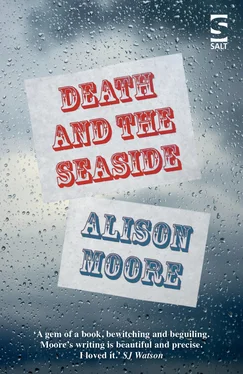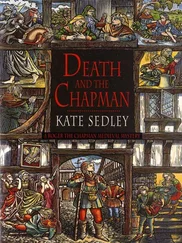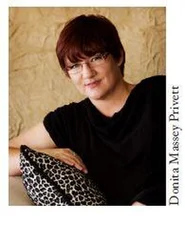Alison Moore
Death and the Seaside
ALISON MOORE’s first novel, The Lighthouse , was shortlisted for the Man Booker Prize and the National Book Awards (New Writer of the Year), winning the McKitterick Prize. Both The Lighthouse and her second novel, He Wants , were Observer Books of the Year. Her shorter fiction has been included in Best British Short Stories and Best British Horror anthologies, broadcast on BBC Radio 4 Extra and collected in The Pre-War House and Other Stories . Born in Manchester in 1971, she lives near Nottingham with her husband Dan and son Arthur.
undertow n. = undercurrent • n. 1 a current of water below the surface and moving in a different direction from any surface current. 2 an underlying feeling or influence.
— Oxford English Dictionary
Sometimes, Susan woke to find that her limbs were dead. Her arm would be flung back, bent beneath her head, the blood stopped, and she would have to move it with her other hand, the dead weight unsettling her, as if she had woken to find a ten-pound leg of lamb lying on her pillow; or one leg would be lying lifeless beneath the other, and she would have to lift the numb leg with both hands, holding it under the thigh and hanging it over the side of her bed like a Christmas stocking that wanted filling. This had been happening to her for as long as she could remember.
This morning, it was her right leg. Sitting on the edge of her mattress, she stretched her blood-starved toes, the nasty comfort of pins and needles bringing her leg fizzing back to life.
She had no curtains at her window, nothing to buffer the daylight in those first few minutes of being awake. She had been promised curtains but, in the meantime, it did not bother her too much. Her room was in the attic, so it was not like anyone walking by could see in. Each morning, she woke to see the window framing the bare sky. The lack of curtains only troubled her if she woke in the night and saw the cold window with all that darkness outside, that big black rectangle in the middle of the long wall.
Her cigarettes were on the windowsill. She stood, testing her foot, feeling only a residual tingling, like froth left popping on the sand when a wave pulls away. She crossed the room and opened the window, letting in the brisk sea air. Leaning on the windowsill, she lit a cigarette. She looked out at the quiet street and the churning waters beyond it.
In the coming week, there would be a bonfire on the beach; there was a poster advertising it on the wall in the pub. They would burn the old fishing boats too, like a sacrificial offering on a funeral pyre.
She smoked her cigarette down to the butt and blew the smoke outside, blowing it downwards, though it drifted up. The slabbed pavement reminded her of a dream she’d had when she was small, in which she jumped from her bedroom window to the patio slabs below and sank, very comfortably, into the ground, as if she were Mr Soft, as if nothing could hurt her. ‘It wouldn’t be like that though,’ her mum had said, in the kitchen in the morning. ‘You’d be lucky just to break your legs.’
Susan let go of her cigarette end and watched it fall to the pavement. She thought of that thing about a feather and a brick descending at exactly the same speed, or a ton of feathers and a ton of bricks. That was in a vacuum though, or on the moon or something. The butt hit the ground and Susan closed the window.
She got dressed, pulling on skinny jeans patched at the knees, and a thin, blue jumper with suede patches on the elbows. She was lanky, all legs, like the harvestmen that so unnerved her. If a predator got hold of a harvestman’s leg, the harvestman could just detach it, as if it were a joke leg. It made Susan think of the fake limbs that she had seen used in art and magic, to create an illusion or just to give someone a fright. She thought of the rubber hand deception, where the imitation hand began to feel like a person’s real hand. The harvestman’s leg was not a fake though; the escaping harvestman left the abandoned limb twitching in the predator’s jaw. Since childhood, animals with spindly legs and backwards knees had set Susan’s teeth on edge. She remembered seeing an emu at the zoo. Something about the way it ran, the way its legs bent the wrong way, had made her cry.
She left the room and made her way downstairs. Usually, she would have gone straight through to the bar and started work, but it was a Monday so the pub was closed and this was Susan’s day off. There were boxes of bar snacks at the foot of the stairs. She took a packet of crisps and left through the back door.
She had come into the Hook on her first day here in Seatown. It was summer, and she had been thinking that until she found her feet she might sleep on the beach, but when she stood on the esplanade, looking out to sea, it occurred to her that the water was likely to come all the way to the sea wall, and some way up it; she might be spending the night on the seabed. Just behind her was the Hook, and from it had come a smell of warm food that made her feel hungry. She went inside, and saw on the bar a jolly polystone pig wearing a chef’s hat and coat and holding in its cloven hooves a carving knife and a chalkboard advertising the special: ham and chips; and she saw on the wall, handwritten on a piece of paper, an advert for a room above the pub. As it happened, the landlady also wanted bar staff, and as no one but Susan had applied for the job or asked about the room, she acquired both and moved in the same day. Each morning, when she started work, she asked about the lack of curtains. ‘They’re coming,’ she was told. ‘Your curtains are coming.’

Susan ate her crisps as she wandered along the esplanade, past the signs that said ‘NO CYCLING’, ‘NO DOGS ON THE ESPLANADE OR THE BEACH’, and, at the top of the slope that went down to the beach, ‘NO DISABLED ACCESS’. The fresh air in her lungs made her want another cigarette, so she smoked while she walked. The tide was coming in. She made her way to the amusements, where they were still advertising for someone to work in the change booth. Every time the manager saw her, he shouted to her, from the confines of the booth, ‘This could be you!’ The booth was perhaps three feet wide by three feet deep, and more than six feet tall with perspex windows on three sides. Sitting in there would make her feel like she was in one of those animatronic fortune-telling machines, like Zoltar, but at least not like Economy Zoltar whose booth was only two feet square and who had no head or arm movement. She would feel like a spider caught under a glass.
At lunchtime, Susan left the amusements with empty pockets. Sometimes, here on the coast, the force of the wind when she met it head-on, when it whistled past her ears and whipped back her short, brown hair, made her think of how it would feel to ride her motorbike without a helmet on, or to freefall. But just now, there was a lull, and she stopped to smoke a cigarette on the esplanade, leaning on the railings, facing the sea.
She had been desperate to get away from home. Even when she was little, she had run away from home, just for the fun of it. That had got her a stinging slap on her bare legs, and her mum had said, ‘You’ve got worse than that coming your way if you ever do it again.’ But then her mum had rolled her eyes and said, ‘You’re just like me.’ Her mum had gone down to Gretna Green in her teens, to marry her boyfriend without her parents’ blessing. ‘You’re making a mistake,’ they had said, but that just made her want him more. They had been right though, about Susan’s dad; Susan’s mum had made a mistake, a bad choice. Maybe it ran in the family.
Читать дальше













